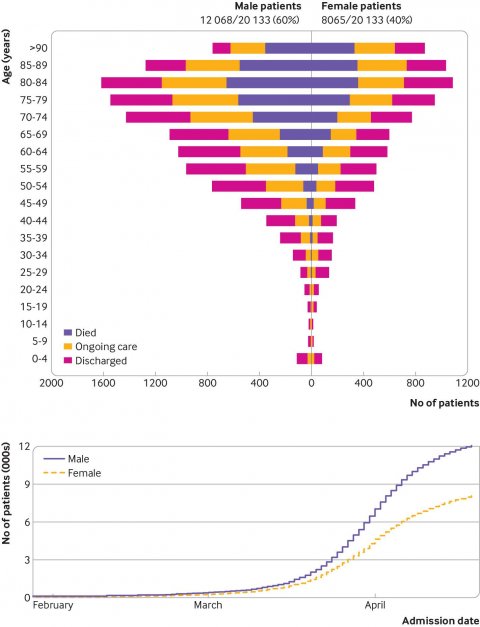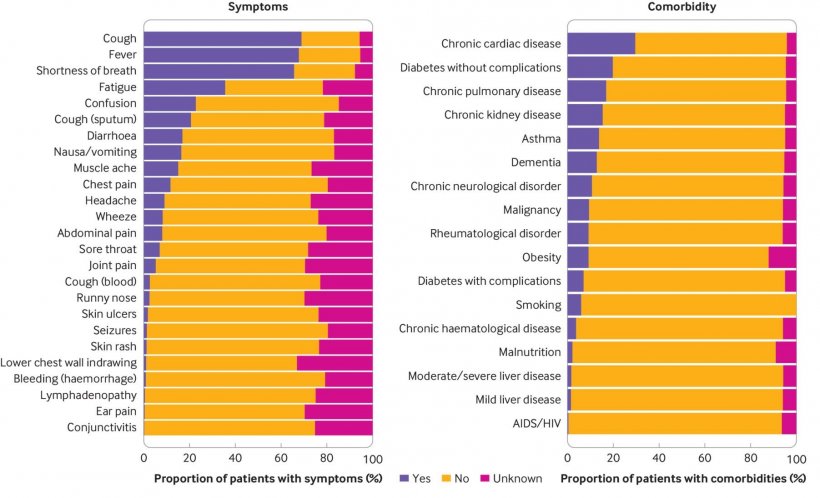News • Profiling the coronavirus
Risk factors for severe and fatal COVID-19 cases identified
Age, male sex, obesity, and underlying illness have emerged as risk factors for severe and fatal cases of COVID-19 in the UK, according to the largest cohort study to date published by The BMJ.
As the largest prospective observational study reported worldwide to date, it provides a comprehensive picture of the characteristics of patients hospitalised in the UK with COVID-19 and their outcomes. According to the Department of Health COVID-19 can be more severe in older people and people with chronic heart, lung, liver and kidney disease, a weakened immune system, diabetes, and some cancers. However, less is known about how the virus exploits age, sex and other underlying health conditions.

Image source: BMJ 2020;369:m1985 (CC BY 4.0)
To address this knowledge gap, ISARIC4C, a consortium of researchers from the University of Liverpool, University of Edinburgh and Imperial College London, analysed data from 20,133 patients with COVID-19 admitted to 208 acute care hospitals in England, Wales, and Scotland between 6 February and 19 April 2020. This represents around a third of all patients admitted to hospital with COVID-19 in the UK. The average age of patients in the study was 73 years, and more men (12,068; 60%) were admitted to hospital than women (8,065; 40%).
Besides increasing age, and underlying heart, lung, liver and kidney disease – factors already known to cause poor outcomes – the researchers found that obesity and gender were key factors associated with the need for higher levels of care and higher risk of death in hospital.
At the time of publication, just over a quarter (26%) of all COVID-19 patients in hospital had died, 54% were discharged alive, and a third (34%) remained in hospital. Outcomes were poorer for those requiring mechanical ventilation: 37% had died, 17% had been discharged alive, and 46% remained in hospital. The pattern of disease we describe broadly reflects the pattern reported globally, say the researchers. However, obesity is a major additional risk factor that was not highlighted in data from China. Patients suffering from obesity generally have reduced lung function and that could play a key role in these patients being at higher risk.
This is an observational study, so can’t establish cause, and the researchers point to some limitations that may have affected their results. Nevertheless, the study clearly shows that severe COVID-19 leads to a prolonged hospital stay and a high mortality rate.
Because the study is ongoing, it has now recruited over 43,000 patients. The findings will help health professionals learn more about how the illness progresses and enable them to compare the UK with other countries.

Image source: BMJ 2020;369:m1985 (CC BY 4.0)
The study is being led by Professor Kenny Baillie at Edinburgh University, Professor Calum Semple at Liverpool University and Professor Peter Openshaw at Imperial College London. The analysis that found the relationship between sex, obesity and poor outcome was done by Dr Annemarie Docherty and Professor Ewen Harrison at Edinburgh University. Professor Semple said: “One in three people admitted to hospital with of COVID-19 in the UK have contributed to this vital research. The contribution of UK patients in such tragic circumstances been critical to improving the global understanding of this terrible disease. We must do everything humanly possible to understand this disease, so that we are better prepared for the next wave of this pandemic.” Dr Docherty said: “Hard data cannot convey the human story of individuals and their loved ones who have suffered, changed or sadly passed due to COVID-19. Yet with every contribution to this important study, patients and their carers, with the assistance of dedicated researchers, have struck a blow in the fight to curb this pandemic.”
This study [...] highlights several crucial questions which researchers, healthcare professionals, the public and patients need answers to
Peter Openshaw
Professor Openshaw said: “This study is quite amazing in that it was launched with such speed and collected so much data. It highlights several crucial questions which researchers, healthcare professionals, the public and patients need answers to. Our research provides an exceptional picture of the illness and risk factors and will underpin a huge range of research. We really appreciate the huge effort that so many people made to send in clinical information and collect samples. It is salutatory to recognise that people risked their lives to collect material for this study. We thank them all as well as the funders, the patients and their relatives, and promise that we will do all we can to find ways to fight the disease.” Dr Baillie said: “There are some things that the UK does very well – working together is one of them, particularly in healthcare. Gathering this information took tremendous dedication and effort from thousands of research staff across the UK. Together they have created an open resource that will be used by scientists across the world to better understand this new disease.”
Source: The BMJ
25.05.2020











